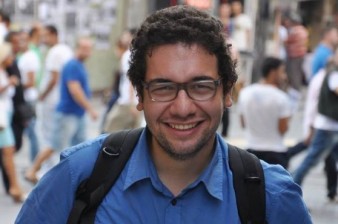
06/03/2015 20:52
Special project: “The Armenian Genocide: Breaking the Silence”. Turkish journalist: Denial is a severe trauma
Ahead of the 100th anniversary of the Armenian Genocide, Aysor.am presents a special project whose purpose is to feature the cultural projects being carried out now.
Turkish journalist, columnist Serdar Korucu has been studying and covering problems of the country's national minorities, including Armenians for a long time and has authored articles appearing in leading Turkish newspapers.
Korucu is the author of "The Kurdish Issue in the Eyes of Foreign Journalists" and "After Syria Went to Wreck and Ruin". He also co-authored the book "1965: 50 years before 2015, 50 years after 1915." Towards the 100th anniversary of the Armenian Genocide, Serdar Korucu, as a representative of the younger generation, spoke of the attitude of young people in Turkey towards the issue and prospects of recognition of the Genocide.
- What would serve as a "wake up call" to a young man like you in Turkey? What would make them take interest in the matter?
- I think it's more related to the environment they grew up in. I live in Sisli. It is a cosmopolitan district: Greeks, Jews, Armenians. We all live side by side. Many of the districts in Istanbul lack this atmosphere, but Sisli still retains it. In our neighborhood, Easter and Christmas are celebrated.
- Being Turkish, is it easy to use the word 'Genocide'?
- Yes, and I easily use it thanks to Rafael Lemkin. The word 'Genocide' was coined by Lemkin. I do not care for the ideological aspect of the word. Lemkin clearly explained the phenomenon he named genocide. Therefore, the word fully reflects what happened to the Armenians. After all, Lemkin said that the word also described what had happened to the Armenians.
- Among young people, the idea circulates that "Armenians were killed, but their number did not reach 1.5 million."
- Even if 500 Armenians were killed, it's a genocide all the same. The phenomenon has nothing to do with quantity. Nowadays, the largest mosques in Urfa are former Armenian churches.
In this case, we're asking ourselves, "Where is the community? Where are the people who attended these churches?" Jugding by the size of the churches, we can assume a large community.
- Once, there were Armenians, today only their traces remain, which are being erased, are they not?
- Yes, once there were Armenians. The cultural genocide continues and that's the worst of it. First of all, the cultural genocide must be stopped, or else nothing will be left for the future. Armenians have left in these lands a cultural legacy created throughout the centuries, which is now being destroyed.
- Looking at the new generation of Turks, what can we say? Is there hope?
- Turkish educational system teaches student that we were killed by Armenians. And not every person is an intellectual or a researcher to have the opportunity to study this issue.
- Does this mean that the generation is not going to change unless the textbooks change?
Yes, it is not going to change. However, nowadays social networks and the Internet in general are also important. People communicate through them. Ideas are being exchanged more openly. For insctance, I consider the ceremony commemorating the victims of the Armenian Genocide in Taksim Square in Istanbul an important event. Civil society's opinion is very important. The Armenian Diaspora also plays an important part in the settlement process.
- The Armenian Diaspora is not particularly liked in Turkey. Why?
- Yes, and there is always a discrimination. Ankara tells the Armenians in Turkey, "You're good, it is your diaspora that puts you against us." But it is also necessary to understand the Diaspora's pain. They lost their names, their surnames. Their family tree was destroyed. They lost their ancestral homes. Their properties were lost. This is a terrible thing.
- Sometimes my Turkish acquaintances tell me, "100 years have passed. Let's forget what happened and move forward." I think they absolutely do not understand our pain. Do you think the Turks will ever understand what we feel?
- I think what most cuases pain to Armenians is that those who do that do not admit their guilt. Denial is a severe trauma. Armenians endure the pain because their grief is not recognized.
- Perhaps Turks avoid recognition, fearing of being branded as descendants of a genocidal nation?
- First we have to understand what we mean by saying 'Turkish'. The fault lies with "İttihat ve Terakki": Turks, Cherkesians and others. This means Turks were not the only culprits. As far as I am aware, Sunni Muslims in general participated in the genocide by "İttihat ve Terakki's" order. Now, is it right to say that Turks were the only ones who committed genocide? A significant part of the property of Armenians was despoiled by Kurds. "İttihat ve Terakki" transformed Western Armenia into Kurdistan. Today, Kurds live in Van.
- How do you think recognition should take place?
- In my opinion, recognition cannot occur by acknowledging and apologizing alone.
- Does that mean that the compensation is necessary?
- That should be jointly discussed by Armenians of the Diaspora, Armenia and Turkey. They should come to a consensus about what they want. In any case, the descendants of those who survived the Genocide must be given something. Even if it is something symbolic, it must be given.
- Looking ahead to the 100th anniversary of the Armenian Genocide, do you have something to say? A message?
- I don't know... You are asking for something difficult... What can I say to people with an indescribably painful past.
The project was prepared with the assistance of the Information and Analytical Center of the Armenian Government Staff.
Newsfeed
Recent news of this section
12/12/2024 17:38








